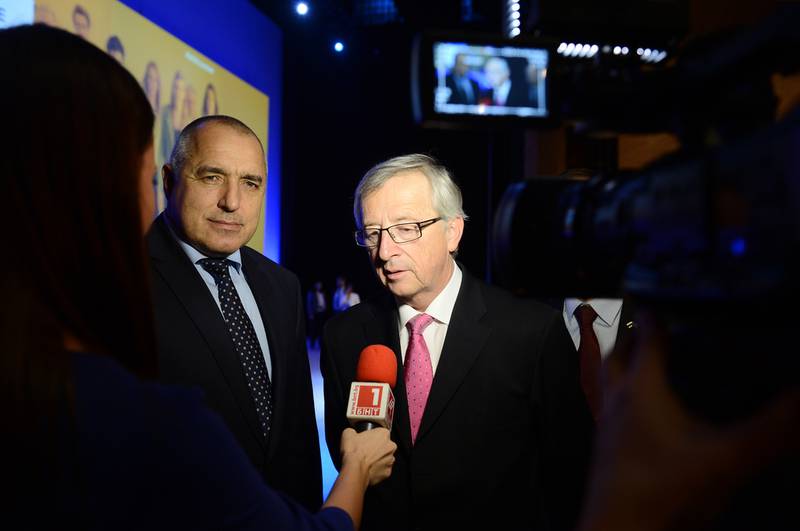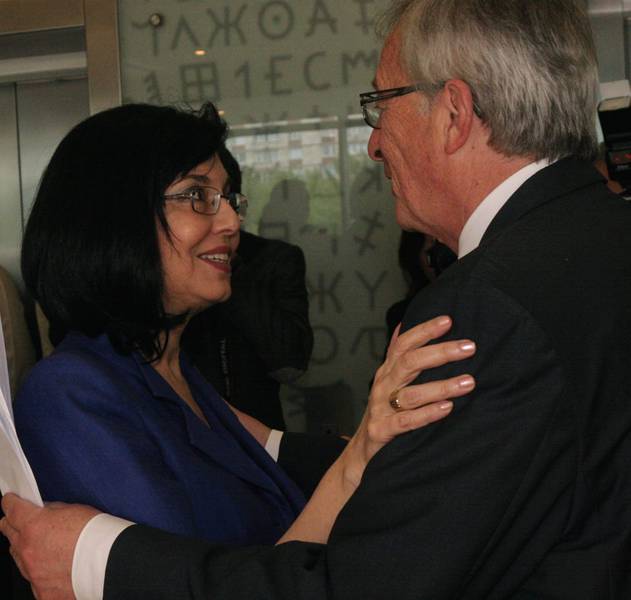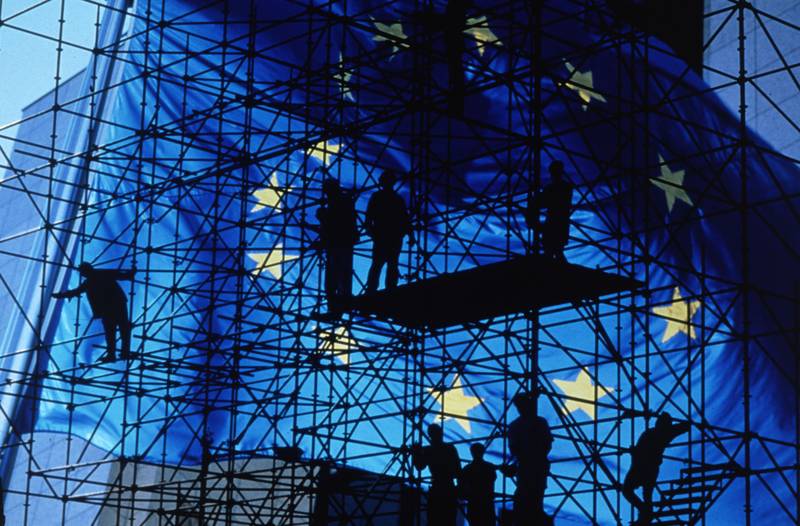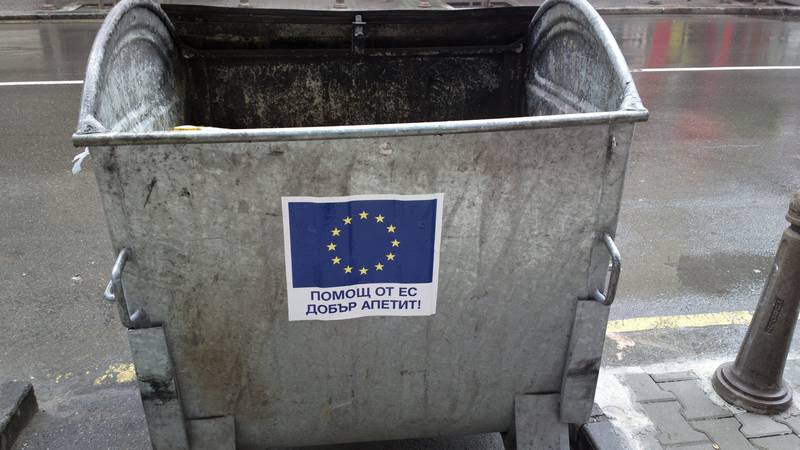What Message Did Jean-Claude Juncker Convey in Bulgaria?
Adelina Marini, April 29, 2014
Two of the key candidates for the European Commission President post sought support in Bulgaria one after another. First, on Friday [April 25], in the country arrived Martin Schulz, the candidate of the Party of European Socialists, as a special guest for the opening of the campaign of the Bulgarian Socialist Party. Two days later, in Sofia arrived Jean-Claude Juncker, the candidate of the European People's Party. Unlike Schulz's, Jean-Claude Juncker's campaign staff work in a much more comfortable way for media which is why it is easy to see what was his main message during all his legs of his European tour. In Sofia, Juncker conveyed several powerful messages.

Bulgaria belongs to Europe
At a time when, because of the Ukrainian crisis, in Bulgaria another division line has been drawn between Russia fans and Russia haters, Mr Juncker recalled in Sofia that on April 25th, 2005, in Luxembourg, during the country's Council presidency when he was prime minster, has been signed Bulgaria's EU accession treaty. "It was the Treaty that brought you back home into the European family", he said nine years later in Sofia. And right when there is a split in Bulgaria on whether Russia is right to annex Crimea or not Jean-Claude Juncker stated: "This Treaty finally reunited Europe and reconciled European history and geography".
Socialists are Christopher Columbus in terms of economic policies
In the poorest EU member state which, however, has excellent financial discipline and some of the lowest levels of government debt, Jean-Claude Juncker said that the current fight is between responsible policy and left policy which intends to create jobs by taking new debt. "We in the EPP know that companies create jobs in the economy, not governments", Juncker underscored and quoted the favourite mantra of the right-wing in the EU that more than 90% of all jobs in the European economy are generated by small and medium sized enterprises. "The socialists, on the other hand, are a bit like Christopher Columbus in their economic policies. When they start, they don’t know where they are going. When they arrive, they don’t know where they are", Juncker added.
It is not clear to what extent the former Eurogroup chief is aware that he spoke in a country which defaulted twice under communist and socialist governments. Equally unclear is whether such rhetoric echoes in the ears of those who consider themselves right-wing voters. Without an answer remains the question how adequate is such rhetorics in a country which is completely engulfed by oligarchy thanks to both left and right governments.
The Mechanism will not be abolished
Jean-Claude Juncker went to Sofia very well prepared. He knew well that the issue that causes much pain (does it still!?) to the Bulgarians is the Cooperation and Verification Mechanism (CVM) with which the country joined the EU on January 1st, 2007 and the aim of which was to ensure that the country will finish the reforms in the judiciary and will make irreversible the fight against corruption and organised crime. Seven years later, the Mechanism is still there and it is controversial whether it has been successful. "As Commission President, I will work for strong respect of the rule of law and a determined fight against corruption in all 28 EU Member States – including but not only in Bulgaria and Romania. I believe in the rule of law, but also in the equal treatment of all Member States. I therefore welcome the initiative of José Manuel Barroso, our current EPP President of the European Commission, to progressively move toward a Rule of Law Mechanism for all EU Member States. You can count on me: I will continue this important work when I am Commission President. And this will, I hope, allow for the phasing out of the Cooperation and Verification Mechanism under my Presidency".
His rival Martin Schulz, too, focused on the fight against corruption saying that if he became president he would help Bulgaria in every step in its fight, whatever that means.
Bulgaria fulfils the Schengen criteria
Jean-Claude Juncker was thrifty in terms of promises regarding Bulgaria's membership in Schengen currently impeded by several member states in the Council which link membership to success under the CVM. Juncker said in Sofia what all others say in the spirit of political correctness - Bulgaria does fulfil all criteria. He hoped that in the next five years the EU will decide whether Bulgaria will "finally" become a fully fledged member of the Schengen area. On this issue, the Socialists' contender said that the ball were in the playground of the European Council. Schulz was frank saying that there were leaders in the Council who had concerns. "As a Commission president I would ensure that all countries will be treated equally and accordingly with the rules", said the European Parliament president in an interview for the Bulgarian daily Trud.
It is evident that on these two very important for Bulgaria dossiers there are no big differences between the two main contenders.
For a European energy union
Jean-Claude Juncker very strongly defends the idea of Polish Prime Minister Donald Tusk, whom he met a little before he went to Sofia, about the creation of a European energy union. "The next Commission will transform Europe into a true Energy Union", Juncker said in Bulgaria. Two of the Bulgarian EPP members share this view. This is a top cause for the Reformist Block in these elections, as the block has initiated meetings with all parliamentary parties to seek support Bulgaria to become one of the founders of the energy union. Blue Unity, too, support such a union. During the meeting of the Reformist Block with GERB (the biggest Bulgarian EPP member), its leader and former prime minister Boyko Borisov said he supported the idea but his previous actions suggest either of a shift of positions of lack of sincerity.

Russia is the enemy
Juncker also believes that the EU should not have any more illusions about Russia. "Russia is testing Europe at the moment. Putin knows well that we do not want war. There is not a single person in Europe that wants war after what we lived through twice in the 20th century. But we cannot let him get away with it. I find it revealing that these days right-wing extremist parties across Europe are defending and even admiring Mr Putin's actions. This is also the case here in Bulgaria", he added without naming Ataka whose leader Volen Siderov opened his European election campaign in ... Moscow after receiving a reward. But is Mr Juncker aware that the government of GERB relied in the same way on Ataka's support as the current government of Socialists and "Liberals" does?
The former prime minister of Luxembourg made a very broadly addressed statement on this issue: "Parties who defend and admire those who place the law of power above the power of international law should not be elected into Parliaments and certainly not become coalition partners in government. We in the EPP, but also all other democratic forces should be very clear about this". A message that was addressed not only to other parties, but to EPP itself which tolerated the authoritarian approach of GERB and also that of Hungary's Prime Minister Viktor Orban.
Juncker's speech in Sofia during the opening of GERB's campaign makes it clear that he, in fact, went in Bulgaria for his own sake. The problem is, though, that in order for you to elect him, you have to decide whom you would vote for - GERB, Blue Unity or the Reformist Block. He recalled that at the past elections in 2009 the voter turnout in Bulgaria was low - 29% and called for a full mobilisation of the voters. Every vote counts, he said, because the stakes are really high. It also became clear that he mainly relies on GERB for the EPP victory over the Socialists, but he said that the votes for the other EPP parties matter, too.
 | © European Commission
| © European Commission | © euinside
| © euinside Angela Merkel | © Council of EU
Angela Merkel | © Council of EU